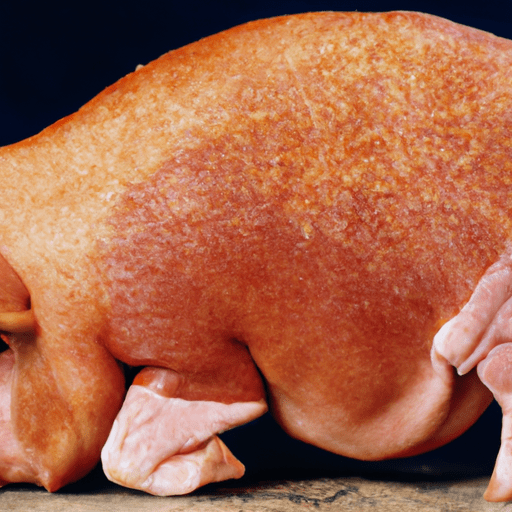The Magnificent Wild Boar Shoulder: A Culinary Delight
When it comes to unique meats that add a touch of adventure to our plate, few things compare to the savory taste and captivating history of wild boar shoulder. This flavorful cut of meat offers a sumptuous dining experience and has been enjoyed by people around the world for centuries. Join us as we delve into the world of wild boar shoulder, exploring its taste, common culinary uses, nutritional benefits, and fascinating facts.
Unleashing the Flavor
Wild boar shoulder is known for its rich, gamey flavor that sets it apart from traditional pork cuts. With a taste that ranges from mild and sweet to strong and nutty, this delectable meat provides an unforgettable dining experience. Its mature and robust flavor profile owes much to the wild boar’s natural diet of roots, nuts, berries, and acorns, resulting in meat that is succulent and earthy.
Versatile in the Kitchen
Wild boar shoulder lends itself to various cooking techniques, making it a versatile ingredient in the culinary world. Whether roasted, braised, smoked, or slow-cooked, this exceptional cut of meat ensures incredible tenderness and succulence, perfect for hearty dishes. The natural marbling within the meat allows it to maintain moisture during prolonged cooking, resulting in flavors that reach extraordinary depths.
From traditional stews and ragùs to hearty roasts, wild boar shoulder adds a unique twist to classic recipes. Its bold flavor pairs wonderfully with aromatic herbs and spices, such as rosemary, juniper berries, or fennel seeds. It also harmonizes beautifully with ingredients like apples, cranberries, and dried fruits, creating a delightful fusion of sweet and savory.
A Nutritional Powerhouse
Apart from its outstanding taste and culinary versatility, wild boar shoulder also offers several nutritional benefits. This lean protein source is lower in fat compared to conventional pork, while still providing essential vitamins and minerals. Furthermore, it is rich in iron, which supports energy production and oxygen transportation within the body. Its high protein content helps promote satiety and muscle growth, making it a valuable addition to a balanced diet.
A Historical and Fascinating Past
Wild boar shoulder holds a special place in history and folklore. Throughout the ages, boar hunting has been considered a noble and coveted pursuit, enjoyed by kings and warriors. The meat’s popularity is deeply rooted in European culture, where wild boar roasts were a symbol of feasting and celebration.
In some ancient civilizations, wild boar was revered for its strength and tenacity, embodying qualities like courage and resilience. Its presence even found its way into mythology, appearing in legends and tales of brave hunters and mythical beasts.
Conclusion
The wild boar shoulder is a culinary treasure that transcends conventional cuts of meat, offering a remarkable taste experience and a glimpse into historical and cultural narratives. From its distinctive flavor to its versatility in the kitchen, this majestic meat ignites the imagination and satisfies the palate. Incorporating wild boar shoulder into your cooking repertoire promises a culinary adventure that is both unique and unforgettable. So, don’t hesitate to explore the world of wild boar shoulder and discover the magic it holds.
Note: When preparing wild boar shoulder, always ensure it is sourced from reputable suppliers and properly cooked.
Wild Boar Shoulder
Origin: Wild boar shoulder comes from the Sus scrofa species, which is native to several parts of Europe, Asia, and North Africa. It is believed to be the ancestor of domestic pigs.
Common Uses: Wild boar shoulder is a versatile ingredient commonly used in various culinary preparations. It is often used to make slow-cooked stews, roasts, and braised dishes due to its rich and intense flavor.
Nutritional Benefits: Wild boar shoulder is a lean meat that offers several nutrients. It is a good source of protein, providing all the essential amino acids required by the body. It also contains vitamins such as B vitamins, including niacin, thiamine, riboflavin, and vitamin B6. Additionally, wild boar is relatively lower in fat compared to domesticated pork.
Unique Properties: Wild boar shoulder stands out due to its distinct flavor profile. It tends to be richer and gamier compared to traditional pork shoulder, owing to the animal’s natural diet and active lifestyle. This unique flavor makes it sought after by those looking for a more robust taste in their dishes.
Historical Significance: Wild boar has been a part of human cuisine for centuries across different cultures. In ancient times, it was highly valued as a source of food and has had symbolic significance in various mythologies and folklore. For example, wild boar hunting was considered a noble pursuit in ancient Greek and Roman cultures, and boar meat was often served at feasts and banquets. Today, wild boar hunting is regulated in many regions to maintain population balance and preserve natural habitats.




Use the share button below if you liked it.
It makes me smile, when I see it.